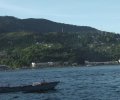Teaching in the Interior
I always went to convents or health centers in the places where there was no hotel or inn and I knew nobody. As no nuns lived in Ilaga, my choice was only Puskesmas, the government health center. As usual, there was no doctor in charge although officially, there should have been. The head paramedic Matias, a Torajan from Sulawesi, welcomed us to use one of the rooms in his house. There was no bed in the room, but the wooden floor was clean enough for sleeping.
The Puskesmas was located a few meters by the airstrip. The wooden building consisted of three rooms: examination, pharmacy, and storage. Two Papuan paramedic assistants helped Matias. They did not need many staff because only on the market day the number of patients was more than ten. The service was officially free, but the staff charged the patients anyway. The people were generally healthy; the common illnesses were upper respiratory tract infections.
Dani and Damal were two main tribal groups in Ilaga. They physically looked similar to me—men were athletic—but their languages are distinct. Interestingly, unlike Indonesian language, their languages recognize gender and plural forms. For example, they greet one male with “kaonak” but males “kinaonak;” one female “lauk” females “lauknya.” I believe there is no stratification, unlike Indonesian, in talking to the chiefs and commoners. The children even greeted me with “kau,” which is very impolite in Indonesian culture. Anyway, I love these egalitarian languages; they make our life simpler.
The wind blew strongly in the afternoon; it caused the flapping tin roofs sound loudly—scarily in the evening. David and I slept in the sleeping bags and bundled our clothes as pillows. I was still shaking from chilling, especially in the early morning. When someone told us there was a hot spring, we decided to go there. Yan Murip, the mantri (male nurse), accompanied us. On the way, many children joined us.
The trip was not easy for me; 6-hour hike up and down steep hills and mountains. I fell down a couple times on slippery tracks; and, if it happened, there was a choir of kaonak from the children. Kaonak has a lot meaning; it could be “hallo” or “how are you?” or in my case “poor him.”
At one spot, many children ran passing me. They carried rocks. I was confused with their behavior. Only at the next bend, I knew what they had been doing. There was a very muddy and slippery path, and they put all rocks covering it. It was a sweet memory for me; caring is universal; nobody taught these children to care of us, hopeless and awkward straight hair in the rugged landscape of Papua. They always held our hands passing difficult paths.
We reached Mayuberi around four o’clock. The villagers already crowded at the border of the village; the messengers must have informed the villagers: stranger, especially foreigner, rarely came here. We passed the first modern building—wooden wall, tin roof—on the right of the path: the primary school. Next was the church before we arrived at small twin houses.
“Selamat datang,” a man greeted us. A Javanese, I could tell from his strong accent. While in around 70% of the population of Kago were Indonesians, Mayuberi had one Indonesian family only: Amir, his wife, and his two-year son. After a brief introduction, Amir asked a boy to clean up the next house for us to stay. The house was supposed for other teachers, but they had never come; it was empty so that we had a lot of space on the floor.
The Mayuberi people called Amir Pak Guru, “Master Teacher.” They did not need to add it with a name because he was the only teacher for the school. Nobody might have known his real name even though he had lived there for five years; before, he had worked in some other areas in the interior. He joined the first group of the Special Programme for isolated tribal peoples in Papua.
Every day, except market day in Kago, he taught four classes—grade 5 and 6 had no pupils yet. The number of students for each varied by natural rhytm: from zero—during the planting season or forest fruit harvesting season—to 10—the abundant food at home. The age range of the student per class was wide; grade 1, for example, from 6 to 15 years old. In fact, in grade 4 I saw a student with moustaches and beard! Schooling was not obligatory; if they liked, they attended the lessons—Amir allowed married men to attend his classes; otherwise, they disappeared for days even weeks to months. Therefore, Pak Guru often searched the students in the village, gardens, or river—they loved fishing—and dragged them to school when nobody showed up.
Teaching four classes simultaneuously needed a special skill. Amir kept moving among three class rooms—that was all the classrooms, in addition to the teacher room, the school had. It was a single building standing on poles; he should have watched his steps if he did not want to end up under the classroom, like I did once. The floors missed a significant number of planks, so were the walls; some planks were dangling—watchout your face before you jump to the muddy floor underneath. The roof missed many of its tin sheets as well: the classes were dismissed when raining. The building was only three years old; it only looked good for only one year before the planks crumpled. The contractor used low quality materials to gain more profit.
On the blackboard in the teacher room, I read six names on the staff list. Amir was not the principal; he was the only non-papuan staff. “Nobody knows where they are,” Amir told me, “but every month someones receive their salaries in Nabire.” Nabire is the regency capital. The Regency Education Office—other Offices too—knew about these “ghost” teachers, but did nothing but issuing warning letter. It did not work. Withholding their salaries? Your life will be in danger. A woman doctor in Mulia was beaten by a Papuan male staff of hers for doing so.
Leap of civilization is another challenge of working in the interior. The Papuans had no written history and they had been in intensive contact with outsiders only in the second half of the 20th century, except for some northern coastal areas. In 1980s, in some areas in the highland they still used stone axes or adzes for cutting trees. Thus, convincing them that spending time in the classrooms for the future career is worthy was a mission impossible.
Like other children in the more developed worlds, the Dani and Damal children were funny and cute but they could be very naughty. Boys are in general spoilt by their parents; discipline was an “alien” to them. Corporeal punishment did not work most of the time; they could endure severe ones due to their excellent fitness. However, Amir knew their weakness: pulling out their penis gourds would tame them. They were embarassed wallking without them, although to us they are not much different, with or without the penis gourds.
Protein source is usually scarce in the Highland, but not in Mayuberi. Its river teemed with crayfish, which looks like lobster. The children sold us three big ones for one uang merah, 100 rupiah (one cent dollar). They even taught us how to fish them. The crayfish hid in small holes on the river walls. We just need a soil worm on a stem of grass; probe the holes; but grabbing them without being bitten by their claws and before they jumped into the river was a different thing. I probed a couple of them but got none. However, for one week, we ate many of these grilled crayfish fished by uang merah.
Mayuberi was cold too, but much less than Kago except in the early morning. It did not bother us much. When the freezing air woke us up, we got out of the house and went to the hot spring—about 75 meters. We waited for the sun heating the air while lying in the pool; there was a mixture if chirping around us: the birds and children. Most of the children joined us in the pool.
Mayuberi is one of the best places I have ever stayed in Papua. The landscape was beautiful; the people were friendly; the crayfish delicious; and the hot spring joyful. Were they the reasons Amir looked happy?
Amir came from East Java as a bachelor ten years before. He went home three years ago and came back to Mayuberi with his wife. They had a boy a year later and his wife opened a kiosk. Amir was luckier than the Matias, the paramedic; he also brought his wife to Ilaga, but she could only endure staying for a week in Kago. Naked people, cold weather, and solitude were too much for her, even with Matias besides her.
Life in Mayuberi was simple. The couple looked content with what they had. On the other hand, just graduated from medical school, my mind was occupied with so many plans. I did not see that we only needed food and love—in addition to living in harmony with the nature and local people—for being happy.





